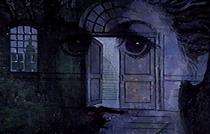Night Gallery

An (initially) hour-long Horror and Speculative Fiction anthology series, hosted by Rod Serling, which ran on NBC for three seasons (1970-1973). Each episode includes multiple segments tied together by the Framing Device of a gallery of paintings inspired by the featured stories. The stories include both originals (many written by Serling) and adaptations of works by the likes of Richard Matheson, Basil Copper, and H.P. Lovecraft. (The segments "Cool Air" and "Pickman's Model" are the first and still most famous Lovecraft adaptations made for television.)
Unusually for the format[1], the individual segments are not of a set length. They range from one-minute vignettes to long stories that take up most of the episode's run time (and everything in between); the number of segments per episode varies accordingly.
The third season saw the show subjected to some Executive Meddling (and possibly Screwed by the Network), with the episode length reduced to a half hour and the timeslot moved from Wednesday to Sunday. It was cancelled midway through the season.
In syndication, the run was stretched by adding repackaged stories from the short-lived Paranormal Investigation show The Sixth Sense and by splitting the first two seasons' episodes into half hours. The latter change led to heavy re-editing, with longer stories cut down and shorter ones padded to fit the new length.
- Genre Anthology
- Museum of the Strange and Unusual: The Framing Device.
- Pilot Movie: One segment of which, "Eyes", was directed by a young Steven Spielberg.
- Spiritual Successor: to The Twilight Zone.
- Adam Westing: Phyllis Diller, known for her piercing voice and laugh, plays the titular Pamela in "Pamela's Voice". That is, she's a dead woman who is haunting the husband that killed her because, among all the things he hated about her, her voice was the number one thing he couldn't stand. It turns out he's dead too, and his punishment in Hell is her heaven, where she can just keep talking, and talking, and talking, and he can't do a thing about it.
- Affably Evil: "The Housekeeper".
- And I Must Scream: "Last Rites of a Dead Druid", and the implied fate the jerk ass protagonist in "A Question of Fear" tries to avoid.
- Argentina Is Naziland: the pilot episode had a segment about a hunted fugitive death-camp officer in an unnamed Latin American country seeking escape in a museum painting.
- Asshole Victim
- Badass Grandpa: Count Dracula, of all people.
- Be Careful What You Wish For: "Make em Laugh" and "The Escape Route"
- Boy Meets Ghoul: several
- Bratty Half-Pint: "Brenda". The only true friend she makes is a shambling monster that gets trapped in a pit.
- Creepy Doll: "The Doll"
- Dead All Along
- Dead Person Impersonation: "Since Aunt Ada Came To Stay."
- Even Evil Has Standards: "The Devil Is Not Mocked". It turns out that the resistance force that the Nazis have been looking for is made up of vampires, and led by none other than Count Dracula. They may feed on human blood, but that doesn't mean they condone Adolf Hitler attempting to wipe out an entire race in mass genocides.
- Fate Worse Than Death: Possible fate looming in "A Question of Fear". Leads to Better to Die Than Be Killed.
- Also shows up in many other episodes, most famously "The Caterpillar".
- Fright Deathtrap
- Gone Horribly Right: "You Can Come Up Now, Mrs. Millikan."
- Gone Horribly Wrong: "I'll Never Leave You - Ever."
- Green Thumb: Or rather, "Green Fingers". The old lady who is being pushed to move out of her home by a realtor claims she can make anything she plants grow. Even, it turns out, bits of herself.
- I Am Not Shazam: The so-called caterpillar in "The Caterpillar" is an earwig.
- I'm a Humanitarian: "Satisfaction Guaranteed".
- Infant Immortality: Averted in "The Dark Boy" and "Little Girl Lost".
- Informed Attractiveness: "The Different Ones". A hideously deformed young man is part of an exchange program with a student from another planet who is part of the program for the same reason. Only the student from the other planet looks like a normal human, and the natives of his planet all look like the student from Earth.
- Ironic Hell: "Hell's Bells"
- Karmic Death
- Laser-Guided Karma: "The Miracle at Camafeo", and "The Caterpillar" among some.
- Living Doll Collector: "A Death In The Family"
- Love Hurts
- Magic Mirror: "The Painted Mirror"
- Mermaid Problem: "Lindemann's Catch"
- Nonhuman Lover Reveal: the series was in love with The Reveal in general.
- Sadist Teacher: "Class of '99". The teacher, played by Vincent Price, is instilling in his graduating class lessons in bigotry and hatred. It helps that they're robots.
- Snake Oil Salesman: "Dr. Stringfellow's Rejuvenator"
- Tomato Surprise: "The House". The ghost that the main character believes is haunting her new home, which she has dreamt about before she knew it existed, turns out to be herself.
- Twist Ending: Frequently.
- The Vamp: "The Girl With The Hungry Eyes".
- ↑ and, oddly, bearing a certain resemblance to Sketch Comedy